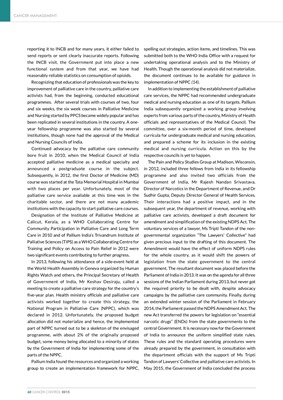
CANCER MANAGEMENT
60 CANCER CONTROL 2015
spelling out strategies, action items, and timelines. This was
submitted both to the WHO India Office with a request for
undertaking operational analysis and to the Ministry of
Health. Though the operational analysis did not materialize,
the document continues to be available for guidance in
implementation of NPPC (14).
In addition to implementing the establishment of palliative
care services, the NPPC had recommended undergraduate
medical and nursing education as one of its targets. Pallium
India subsequently organized a working group involving
experts from various parts of the country, Ministry of Health
officials and representatives of the Medical Council. The
committee, over a six-month period of time, developed
curricula for undergraduate medical and nursing education,
and prepared a scheme for its inclusion in the existing
medical and nursing curricula. Action on this by the
respective councils is yet to happen.
The Pain and Policy Studies Group at Madison, Wisconsin,
in 2012, included three fellows from India in its fellowship
programme and also invited two officials from the
Government of India, Mr Rajesh Nandan Srivastava,
Director of Narcotics in the Department of Revenue, and Dr
Sudhir Gupta, Deputy Director General of Health Services.
Their interactions had a positive impact, and in the
subsequent year, the department of revenue, working with
palliative care activists, developed a draft document for
amendment and simplification of the existing NDPS Act. The
voluntary services of a lawyer, Ms Tripti Tandon of the nongovernmental
organization "The Lawyers' Collective" had
given precious input to the drafting of this document. The
Amendment would have the effect of uniform NDPS rules
for the whole country, as it would shift the powers of
legislation from the state government to the central
government. The resultant document was placed before the
Parliament of India in 2013. It was on the agenda for all three
sessions of the Indian Parliament during 2013, but never got
the required priority to be dealt with, despite advocacy
campaigns by the palliative care community. Finally, during
an extended winter session of the Parliament in February
2014, the Parliament passed the NDPS Amendment Act. The
new Act transferred the powers for legislation on "essential
narcotic drugs" (ENDs) from the state governments to the
central Government. It is necessary now for the Government
of India to announce the uniform simplified state rules.
These rules and the standard operating procedures were
already prepared by the government, in consultation with
the department officials with the support of Ms Tripti
Tandon of Lawyers' Collective and palliative care activists. In
May 2015, the Government of India concluded the process
reporting it to INCB and for many years, it either failed to
send reports or sent clearly inaccurate reports. Following
the INCB visit, the Government put into place a new
functional system and from that year, we have had
reasonably reliable statistics on consumption of opioids.
Recognizing that education of professionals was the key to
improvement of palliative care in the country, palliative care
activists had, from the beginning, conducted educational
programmes. After several trials with courses of two, four
and six weeks, the six week courses in Palliative Medicine
and Nursing started by PPCS became widely popular and has
been replicated in several institutions in the country. A oneyear
fellowship programme was also started by several
institutions, though none had the approval of the Medical
and Nursing Councils of India.
Continued advocacy by the palliative care community
bore fruit in 2010, when the Medical Council of India
accepted palliative medicine as a medical specialty and
announced a postgraduate course in the subject.
Subsequently, in 2012, the first Doctor of Medicine (MD)
course was started at the Tata Memorial Hospital in Mumbai
with two places per year. Unfortunately, most of the
palliative care service available at this time was in the
charitable sector, and there are not many academic
institutions with the capacity to start palliative care courses.
Designation of the Institute of Palliative Medicine at
Calicut, Kerala, as a WHO Collaborating Centre for
Community Participation in Palliative Care and Long Term
Care in 2010 and of Pallium India's Trivandrum Institute of
Palliative Sciences (TIPS) as a WHO Collaborating Centre for
Training and Policy on Access to Pain Relief in 2012 were
two significant events contributing to further progress.
In 2013, following his attendance of a side-event held at
the World Health Assembly in Geneva organized by Human
Rights Watch and others, the Principal Secretary of Health
of Government of India, Mr Keshav Desiraju, called a
meeting to create a palliative care strategy for the country's
five-year plan. Health ministry officials and palliative care
activists worked together to create this strategy, the
National Program in Palliative Care (NPPC), which was
declared in 2012. Unfortunately, the proposed budget
allocation did not materialize and hence, the implemented
part of NPPC turned out to be a skeleton of the envisaged
programme, with about 2% of the originally proposed
budget, some money being allocated to a minority of states
by the Government of India for implementing some of the
parts of the NPPC.
Pallium India found the resources and organized a working
group to create an implementation framework for NPPC,